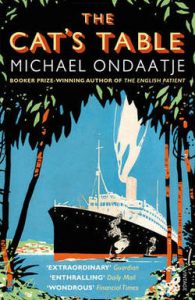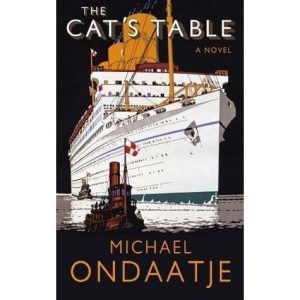The Cat’s Table – Michael Ondaatje – 2011
Posted by Steven on 16/4/2013, 22:35:54
I finished The Cat’s Table this evening. It’s a much more serious book than Skios, but short and easy to read. It is partly autobiographical, but it also has a lot in common with The English Patient in that Ondaatje throws together an oddly assorted group of damaged people with clouded pasts.
Anyone else reading it?
~


Posted by Steven on 18/4/2013, 22:49:39, in reply to “Re: The Cat’s Table (non-spoiler)”
I’ve been rather distracted lately by the news from West, Texas. It’s about 90 miles away, so I didn’t feel or hear the explosion, but I’ve passed through the town several times a year for decades and often stopped at the Czech bakery for kolaches. So for now I’ll just start with the review I had already posted elsewhere (it is a non-spoiler), and the observation that, based on the four books I’ve read, Ondaatje’s novels tend to get easier as he gets older. (The same is true of Mario Vargas Llosa.) Here is the review:
It is 1954 and an 11-year-old boy named Michael embarks alone on an ocean liner bound from Ceylon (now Sri Lanka) to England. A lady friend of the family is technically his guardian on the voyage, but she is a first class passenger and rarely sees him. Michael shares a tiny windowless cabin with a member of the crew. At meals he joins two other boys his age and several adults at the table farthest from the Captain’s Table. It is traditionally known as the Cat’s Table.
Michael comes of age during the 21-day voyage, partly due to the freedom he and the other boys experience and its sometimes serious consequences, partly due to the bizarre and dramatic events to which he is witness, but largely due to the adult acquaintances he makes at the Cat’s Table. Michael learns that people are rarely what they seem, that his life “could be large with interesting strangers,” and that “What is interesting and important happens mostly in secret in places where there is no power. Nothing much of lasting value ever happens at the head table, held together by familiar rhetoric.”
Michael tells his story in the first person, with occasional leaps forward in time to his young adulthood and his maturity as a novelist living in Canada. The autobiographical aspect is obvious, though Ondaatje says in a postscript that the characters and events from the ocean voyage itself are fictional.
The novel is mostly about the forming and breaking of relationships–some rewarding, some painful, and some dangerous–the hidden truths about people to which we are blinded by our assumptions and expectations, and the lasting effects of those relationships. But it is also about art and how, as with our human relationships, we read meaning into it that we expect to see and often come away satisfied with a superficial understanding.
The Cat’s Table is an entertaining story with moments of humor, mystery and suspense. As with The English Patient, Ondaatje brings together an assortment of colorful characters with troubled pasts, only this time we see it all through the eyes of a child. The machinations necessary to give us the backgrounds of adult characters whom the narrator meets only briefly as a child can be awkward at times, but overall I found this a very rewarding novel.
~
Posted by guillermo maynezEmail User on 19/4/2013, 17:58:37, in reply to “Re: The Cat’s Table (non-spoiler)”
Steven: it’s awful what’s happened in West (and also in Boston), I’m sorry and hope no personal loss for you or your loved ones has been sustained.
Thanks for taking the time, as always, to post your comments. I especially agree with your assertion that the book is primarily about how relationships are formed and then developed or lost. I was talking with my 21-year old nephew the other day, and I told him that he is making now what will most likely be his friends for life, although it’s hard to know exactly who among them will he be still seeing in twenty years’ time. One reaches an age when one can look back and wonder: some guys I thought would be my forever pals I barely know what’s become of, while other guys whom I thought once were occasional acquaintances are now my closest friends, people I spend time with several times a month. Who can tell? I once met a friends’ friend over a weekend at the beach, and now he’s my brother in law (he’s the father of the 21).
That perspective is what gives this book a poignancy and beauty way beyond the simple (and entertaining by itself), bunch of stories from the trip. These are certainly wonderful: the mysterious prisoner, the deaf girl, the hydrophobic millionaire, the night of the storm, etc., as well as the characters that populate the ship. But we have an extra dimension in the recollection of what became of many of them after the trip.
Somehow, I felt I got to know more about Ramadhin and Cassius, even as adults, than about the Michael narrator himself. Probably that was deliberate on the part of the author, and I don’t think is a problem: the narrator is a little left in the dark, adding to the shadiness of life after a coming-of-age experience.
The trip itself (and I understand that despite Ondaatje’s protests there is a strong element of autobiography here) sounds like a marvelous experience for any 11-year-old. I, for one, would have loved to have a similar one, and I think it is rendered in a beautiful, smooth, colorful way.
~
Posted by Steven on 19/4/2013, 23:20:57, in reply to “Re: The Cat’s Table (spoiler)”
No, I don’t know anyone in West (or Boston), but it’s hard not to be distracted by the news, especially when it’s from a place fairly close by.
One episode in Cat’s Table really stuck out to me, and that is the runaway dog seeking out and biting the hydrophobic millionaire, then vanishing. This seemed almost to be a bit of magical realism. I’ve certainly never heard of animals being attracted to another animal or person with hydrophobia.
Another interesting point is the probably deliberate ambiguity with regard to race and national origin. We are left guessing for a while whether Michael and Emily are Sri Lankan or English.
I found it surprising, even for the 1950s, that unescorted minors were not only allowed to travel virtually unsupervised but were assigned to share cabins with adult crew members.
The picture of the ship passing cargo, mail, etc. without stopping while moving through the Suez Canal was quite memorable. I suppose quarantines, import controls, and especially security have put a stop to such practices now.
That’s good advice for your nephew. Unfortunately frequent moves and other factors prevented me from forming any strong or lasting friendships as a child or young adult, and I’ve always been envious of those who did.
~
Posted by Sterling on 27/4/2013, 15:04:15, in reply to “Re: The Cat’s Table (spoiler)”
Okay. I’m starting to turn into the curmudgeon of this group! I don’t like it, but there it is. I’m about 75% through The Cat’s Table on my kindle, and for the life of me, I don’t see any reason why I should finish. This is all much too twee and precious for my taste. You guys know me. I’m not some philistine who insists on the literary equivalent of car chases and bomb explosions. But I do feel like I’m lapsing in my dotage into a literary second childhood. My problem? THERE IS NO STORY HERE! I want a plot! I want characters I can care about. A protagonist and an antagonist might be nice. I need some narrative drive. I need a reason to keep reading. I need a reason to pick the book back up after I’ve set it down.
It’s not that I require every book to be a “ripping yarn,” but the author has to be able to pull off something special if he wants to keep me interested with no plot. In Search of Lost Time has more plot, although admittedly stretched out as thin as piano wire. Ulysses has a plot, although it helps to be familiar with the Odyssey to discern it. The Cat’s Table is a grab bag of sub-plots and potential stories, none of which are satisfactorily developed. It just meanders with no apparent structure through his reminiscences. I felt like I was listening politely to a boring elderly dinner companion who talked on and on without ever coming to the point.
The one exception was the incident of the little dog and the rabid millionaire. That was a genuine shock. After something that jaw-dropping, I settled in thinking, “Okay, it’s going to get good now.” It didn’t.
~
Posted by guillermo maynez on 29/4/2013, 11:05:46, in reply to “Re: The Cat’s Table (spoiler)”
Well, I’m sorry I recommended it to you after having read it, and that you didn’t like it. I had never heard of this book until someone proposed it for our book club. But I liked it. I get your point, though. Most “literary” contemporary books don’t have a plot in the sense that you describe. What could be the reason for this?
~
Posted by Sterling on 29/4/2013, 22:11:27, in reply to “Re: The Cat’s Table (spoiler)”
No need to apologize, Guillermo. All any of us can do is to recommend what we have enjoyed ourselves. I’m always interested in what you suggest. Most of the time you and I are on the same page and in agreement. Maybe I just wasn’t in the right mood or something.
About plot, my theory is that the plotlessness of many modern literary novels is part of the general move to abstraction found throughout Modernism. Paintings ceased to be representational. Classical music lost most of its audience entirely by jettisoning melody and harmony and basically becoming pure, abstract sound. Poetry, as well, completely drifted away from the audience that Byron or Tennyson or even Yeats had by becoming nearly impenetrable. Plot became a Victorian convention to be overthrown. To some extent, post-modernism began to reverse this trend. Pynchon, for example, took the opposite tack of plotting so densely that his novels are challenging to follow.
I think a change is happening at the moment. Music has become more tonal. Recent trends in art seem to incline toward a heavy use of video, which is representational almost by definition. The youngest author we have read as a group is, I believe, David Mitchell, who most definitely writes plots. Jacob de Zoet is almost an old-fashioned adventure story. Even Cloud Atlas is composed of several accessible stories. Is he part of a gnenral trend? Time will tell.
~
http://www.thecrimson.com/article/2011/11/15/ondaatje-cats-table-review/